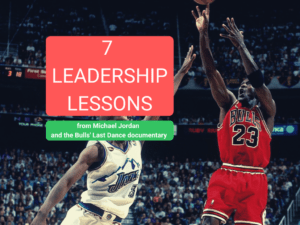SPOILER ALERT!
In this article, I have summarized 7 leadership lessons that every CEO or manager can learn from the Bulls’ epic adventure and from one of the best and most emblematic sportsmen in the world.
The Last Dance is a documentary about the greatest basketball team of all time and their superstar Michael Jordan! If you haven’t watched it on Netflix yet, you may want to binge-watch the 10 episodes of that inspiring documentary before you read this!
[lwptoc min=”1″ skipHeadingLevel=”h1,h3,h4,h5,h6″]
1) Trust your teammates to make the shot
Countless times before, like that famous buzzer-beater shot against the Cleveland Cavaliers with only 3 seconds to go, Michael loved to take his responsibilities to make the final victory shot (goose-bumps guaranteed with the video below!!!).
But in the finale series vs the Lakers in 1991, when it is 80 – 80 in the last quarter of the game, he learned to be a different leader!
This time, he listens to Phil Jackson’s coaching and decides to trust his teammate John Paxton for the last moments of the game: he fakes to take his responsibility to free Paxton and gives him the ball to make the difference…and John made it. He realized that it works, so he kept on doing it for the rest of the game and they won! He learned that the other guys can help him out.
A couple of years later, against all expectations, he did the same thing with Steve Kerr: he created the illusion to go for the last shot, brought defenders against him to free his teammate and gave him the ball for the final shot.
So it is great to lead by example, it is great to take the pride at being the best, it is great to try to do as much as you can on your own, but you have to trust your teammates and give them the opportunity to shine and take the shot if you want them to grow, to become amazing players too, to be better as a team. As Michael said: “Talent wins games, but teamwork and intelligence win championships.”
2) Lead by example – When leaders work so hard, everyone wants to work as hard
Jordan was considered sometimes a tyrant by his peers.
Indeed he pushed his team’s mates at their limit and sometimes beyond, but they didn’t have any resentment against him because he was so driven, so committed, pushing himself so hard and because he was never asking them something he wasn’t doing himself. So if you want to push your team, first start to lead by example.
3) Competition should be a driver to become better
Jordan would always find a reason to motivate himself, and very often, he would find it in his competitors, whatever it was, for instance when somebody else was nominated MVP and he thought he was better than that person, or when another player teased him in the media or trashed talk him during the competition. So don’t be afraid of the competition, embrace it to become better!
4) Do not care about people’s opinions.
When asked how he handles everybody’s expectation about him to do or not do certain things, Michael said:
‘The way I go about my life is I set examples. If it inspires you, great. If it doesn’t, then maybe I shouldn’t be the person you follow!’ Same for you: do what you do because you love it and stop caring about what everybody else thinks.
5) When you are at your weakest, you can find extra resources.
Against the Uta Jazz, Michael was in pretty bad shape, having thrown up all night, a terrible start of the game with lots of missed shots, he looked completely gassed during the first quarter, but as Pippen said “lots of times, when you are sick, you are able to find something deep down inside that you didn’t know was there. He wanted to win so badly, that he stayed with it. And he pulled the team to the victory once again. However down you feel, there are extra resources within you that you have to find to pull it together.
6) Live in the present.
Most people live in fear because they project their past into the future. Michael was completely present, that was his separator compared to other great players, that’s what made him the greatest player of all time. Michael wouldn’t allow to let something he couldn’t control get in his head. MJ made a LOT of decisive last-second shots. However, he also missed some of them, but he never let that make him fear to take the next one. A great example: even though he missed an “easy” free throw 40 sec before the end against Utah at 85-85, he managed to scoop up the loose ball, then shot a decisive 3 points right after.
7) Let your players be who they are and learn to give them a break at the right time.
Phil Jackson is one of the greatest coaches of all time, and one of his secrets is to let the players be themselves, with their strengths but also their flaws. He let Dennis Rodman be himself and do what he does:
https://www.youtube.com/watch?v=c6EncpOnLdY&feature=youtu.be
In this last final series, after game 3’s victory, Dennis went up wrestling, disappeared from the radar (= had a rough party night), and missed the practice the day after. Some coaches would have made a fuss about it, but Phil just let it go. He knew that Rodman is there 100% on the court when they need him and that was the most important to him (and he played one of his best games right after). Another time, he gave the players a vacation day right before another important game. As Michael said: “a younger coach would have made us practice today”. So don’t try to make everyone fits in a mold, let people be themselves, and learn to know when to push people to work hard and when to give them a break in order to perform better after!








